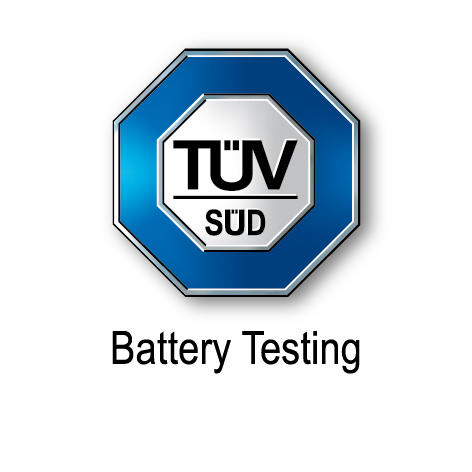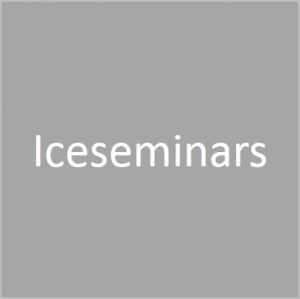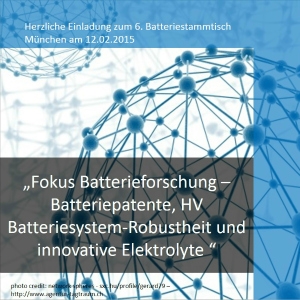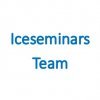
Ice Seminar Team
Prof. Hans-Georg Schweiger, TH Ingolstadt
1. Welchen Fokus/Schwerpunkt haben Sie im Bereich chemische Energiespeicher?
Der Schwerpunkt liegt im Bereich der Energiespeichersysteme für HEV und EV. Besonders im Fokus stehen dabei die Themen wie die Sicherheit und Robustheit der Energiespeichersysteme. Ebenso spielt die Fahrzeugsicherheit von Hybrid- und Elektrofahrzeugen und die Bildungsforschung im Bereich der Elektromobilität eine große Rolle.
2. Welche Lösung(en) bietet Ihre Organisation in diesem Bereich an bzw. welche sucht sie?
Umfangreiche Testmöglichkeiten für die Erprobung von Zellen, Batteriemodulen und Batteriesystemen. Einzigartige Forschungsmöglichkeiten mit dem Modularen Laborfahrzeug in CARISSMA. Damit sind Bearbeitung umfangreicher Fragestellungen im Bereich der Forschung zur Fahrzeugsicherheit von Hybrid- und Elektrofahrzeugen möglich.
3. Wo sehen Sie die größten Herausforderungen für chemische Energiespeicher in den nächsten 5 Jahren?
Reduktion der Kosten auf Ebene der Zelle wie auch auf Ebene der Batteriesysteme. Daneben Steigerung der Energiedichte wie auch der Lebensdauer und der Sicherheit.
.4. Was macht Deutschland im Bereich chemische Energiespeicher richtig?
Im Bereich der Batteriesystementwicklung schon weit vorne. Zum Beispiel 1. Lithium-Ionen-Batteriesystem für HEV weltweit in Serie (seit 2009).
5. Was könnte man besser machen?
Serienfertigung von Batteriezellen im großen Stil fehlt in Deutschland. Bessere Standardisierung im Bereich der Zellformate und der Ladetechnik.
6. Der Batteriestammtisch ....
Eine sehr gute Möglichkeit zur Vernetzung zwischen Forschung und Wirtschaft.
Prof. Hans-Georg Schweiger, TH Ingolstadt
Februar 2015
The global and German battery market 2015 - Battery technology, EV and grid storage - an interview
Interview with Shmuel De-Leon & Arnbjörn Eggerz - extended transcript
Introduction:
The video contains an interview with the battery expert Shmuel De-Leon with Arnbjörn Eggerz. The transcript of the video here has been edited for readability, the content is the same apart from minor additions for clarity.
We talk about the global and German battery and electrochemical energy storage market in 2015. It discusses recent trends in battery technology, trends and companies to watch out and the key issues like battery production for the German market. Of course, Grid Storage and EV batteries are also a topic as well as German battery research and other important battery industry issues.
Arnbjörn Eggerz: It’s a pleasure to have you here, Shmuel. It’s always very difficult to catch you so we are more than lucky, that you had another hour at the airport.
Thus, let us directly start to talk about the global and German battery market. Shmuel, we are already in Quarter I/2015. So, what are the latest developments in the global battery market?
Shmuel De-Leon: Shmuel De Leon: We see some progress in several directions. Some new technologies seem to have, in my opinion, the potential for breakthrough.
I am talking about Solid Electrolyte batteries. Most of the market thought 3 or 4 years ago that this technology is a dead end. Nevertheless, there is a renaissance with that technology, led by Toyota, Samsung, Apple and some other players. The big advantage of Solid Electrolyte batteries is that it means no organic liquid, no risk for leaks and no risks for fires while energy density is better. This is one direction.
The second direction is silicon: silicon stores 10 times more energy than graphite as an anode. Mixing it together with graphite and coming to the market with the first solutions, can increase the energy density. This is something all of us are really looking for. This year we start to see the first cells on mass production with some sort of silicon inside.
Another candidate is Lithium Sulfur. It is a technology that was developed many years ago with many problems, not easy to handle. But we observe first companies - as e.g. Oxis Energy from the U.K. coming with cells to the market. It is the first generation with 200 Wh/Kg. Still it is not the density we expected. But we hope that in several years they will come with better cells having an energy density that “beats” the current solution. So this is a start.
Arnbjörn Eggerz: Well, you already named many developments going on. Besides this technology trends, do you see any other kind of unexpected issue or new fact emerging that is changing the industry?
For example, here in Germany, we often discuss about the fall in the oil price and its impact on renewables and in consequence on energy storage as it is a part of that value chain.
Shmuel De-Leon: Well, I will say that the need for batteries always exists. It is a bread, it is not a cake. We need it. The amount of applications, we are using batteries for, grows. I do not see a change from that perspective. Production worldwide will grow.
But - we still have some problems, problems with technologies, problems with costs. Then, the world is not balanced: production is mainly in Far East/R&D - albeit all over the world - is mainly in western countries. And I hope that R&D will bring the fruits that we are looking for in the coming 5 years.
Arnbjörn Eggerz: Thus, this means we still observe a kind of overproduction as we saw during the last years especially driven by the EV expectations, but resulting in a disappointment?
Shmuel De-Leon: You can see several trends.
First one: Laptops and consumer electronics move to power cells and prismatic [cells]. Cylindrical cells lose their place there.
Secondly, we see that the E-mobility is suffering because of the low oil cost. Expected sales for the coming years grow, but not with the expected rate.
Grid storage is also only in the childhood period. There is some production and sales for this application, it grows, but not with the numbers that we have been hoping for.
Therefore, in general, that could lead to some excess production. I would say that sales kept about the same value or are going down. That is the situation.
Arnbjörn Eggerz: You already named so many new technologies. What is then the number one? The number one newcomer or number one start up technology of all the many you named. Where should be the focus?
Shmuel De-Leon: I think that the number one are Lithium Rechargeable Cells with silicon nanostructure anodes. I was just last week in a conference in Aschaffenburg/Germany and we saw the road map of Panasonic and LG Chem. Both come first with some solution with silicon and in mass production.
Arnbjörn Eggerz: Thank you. Now we focus on Germany. What are you general comments on the German market, which is the most important in Europe, I think?
Shmuel De-Leon: Germany is the best market for batteries in Europe, definitely, but unfortunately in the last 2-3 years we are facing some problems with production. Several battery cell makers close or closed business. I am talking about Repenning in Hamburg, I am talking about Li-tecthat closed the cell production and we have difficulties with Lechlanche although they recover slowly – We see one positive company EAS (Used to be Gaia) that start cell production again.
Arnbjörn Eggerz: Daimler also sold some activities …
Shmuel De-Leon: Daimler actually decided to buy cells from Far East and not to manufacture cells in Germany.
Arnbjörn Eggerz: You directly point to the problem we have been discussing during the last month with many market participants. So I am just picking up this observation.
Let me explain: There was this enthusiasm in Germany about battery production accompanied by lot of investment in R&D. Now there is “disappointment” about the economics shared by many at least when talking.
As I think, it does not make sense to talk about price development of batteries and necessary price tags for electric vehicles since it is commonly known, let us follow another path.
We just go through the global value chain of batteries and see where German technology might fit in here. I am just naming shortly the word and you just comment on it. The first word of the value chain: research. What are your comments on German research with respect to a global value chain from an international perspective? Do we have a situation where we do the research here and then we just have to sell it [the R&D not profiting in another way]?
Shmuel De-Leon: I would say there is a lot of R&D on batteries in Germany. Germany is a leading country in R&D. You have excellent universities, institutes like Fraunhofer and a lot of R&D is done here also by companies. From this perspective, I think its o.k.
Then, material production: We can see some German material production for the world supply chain.
The problem comes when we talk about cells. The issue is that the government should understand that Lithium batteries, batteries in general, are the energy of the future.
As such, production should be key point for each country. Thus, the right model for Germany should be developed in order to continue production of cells here and not to just import them from overseas.
Arnbjörn Eggerz: I have to come back to the research question and challenge your answer.
For example, recently there was a study by TU Munich, showing that - albeit Germany picked up research - it is still lacking far behind, especially in Lithium Ion compare to Asia measured in patents. In consequence, one open questions is: What if we say, “O.k. let leave this part of researcher aside. If you -the carmakers- do want to have this technology, just simply buy it from outside.” While we focus [public] R&D in other technologies, where there could be some more foothold for a German participation in this particular technology value chain. How would you see that?
Shmuel De-Leon: Well, R&D is a key point here. If you want to keep Germany leading in this area R&D should be kept here.
Arnbjörn Egger: But in all technologies?
Shmuel De-Leon: All the leading technologies and the technologies for the future. But again, the key point is production. There is the need to think: What can and should be done that production in Germany is cost effective and cell manufacturing will have such performance and associated costs to be attractive in the world competition. I think it can be done with the right plan.
Arnbjörn Eggerz: Besides production – and I will pick it up immediately again - is there anything else on the list with respect to the value chain check. I mean we have chemistry on the list, software, battery management systems, and production tools – meaning “how to set up the factory” or testing. Are these points less important? Or is with respect to them everything ok here in Germany and the only issue is production?
Shmuel De-Leon: Of course, when we are dealing with rechargeable batteries we are dealing with the system. We are dealing with the charger; we are dealing with the battery. The battery includes electronics, the battery management system and packaging and many other features are inside and necessary. When we talk about a healthy industry, it should provide everything and we expect production of all kinds of equipment and parts needed for establishing a good and healthy battery industry here in Germany.
Arnbjörn Eggerz: Since you already answer the question that battery production in Germany is the key strategic point, what should we do? Where do you see the tipping point or action items to establish/maintain it here?
Shmuel De-Leon: I would say that material cost is the same worldwide; not including materials made in China, which cost less, but on the other hand, quality is not the same. But materials have the same cost.
The key point here is the automation, because if you have the right automation you can reduce costs dramatically and this is one important aspect.
Secondly, government support for establishing your business: batteries are the basic for many technologies. So having an In-House [meaning In Country] battery industry is something that can support in the other business areas. Therefore, it makes sense to subsidize and support companies and to have a solution in-house.
Arnbjörn Eggerz: Maybe we should join and make a study about battery production in Germany and how to keep it here?
Shmuel De Leon: I think that at least having one day of discussion together with all the battery experts in Germany, also adding the decision makers from the political side, analyzing the topic and what should be done, could be a good idea.
Arnbjörn Eggerz: Before I come back to subsidies - what is your advice for German car producers and suppliers? To illustrate the situation, let us recall the discussion about the Tesla giga factory. After the announcement the sentiment and statements were like “woow this is big news” followed by “oh we have to move”. Since then we just went on and nobody is talking about it any longer. How do you see that and what is your advice to BMW, Audi, VW or Porsche?
Shmuel De Leon: I say, first of all [they should start] thinking out of the box. Thinking out of the box means to check also different opportunities e.g. of cylindrical cells for EV batteries like 18650 type batteries. It means to not just concentrate on prismatic cells and having one source.
If you want to encourage competition and production, we should have at least several option and not one option in our hands. So that something that I would like to see. Beside that of course we talk about the battery costs, the battery is the most expensive part in the electric vehicle and there is no other way overall: we have to increase performance, reduce cost, become more efficient; and this is a challenge. It is not easy, but this is the key to establish e-mobility.
Arnbjörn Eggerz: So you recommend out of the box thinking for the car industry. This is a difficult, difficult topic.
Now I want to leave e-mobility aside for a moment, because we talk so often about it.
I want to focus on grid storage, which is as supported by many facts the “hot iron” of today. In addition, I would like to pick up the word of subsidies here, because based on the observation “we see sold systems and we see many systems coming from China” the question in the end is the following. The question is how Germany should think about this problem in order not to end up exactly with the solar panels, meaning Germany is the installment base and China is the production base. I see the connection of the two questions wondering what government subsidies can really do,
Shmuel De Leon: First, grid storage is a newcomer. I would say that the progress in that industry much slower than we expected before. It is needed, definitely.
Of course, instead of building new power plants, a better solution is to use the current energy production more efficient.
The issue here is that you are right. There were subsidies in Germany for the solar panels. Whenever there is such a situation, the industry grows and that in consequence supported the storage solutions for the grid, because it is needed for the solar industry, but when subsidies where reused a crisis broke out.
Regarding production, it is a matter of facts that production of batteries is much cheaper in Far East. It is the exactly the same problem as with cells. So if you want to have production, you need automation and you need to keep the quality gap and to compete.
I mean there is no other way … to compete.
Arnbjörn Eggerz: Competition won with solutions that are more intelligent. Your point brings me to the nearly last question. Batteries and chemistry is considered hart science moving slowly. At the same time, we see digitalization, making everything faster, everything quicker. Today it seems you can accelerate almost everything.
Do you see an impact of this kind of digitalization into this hard science, into the field of batteries, battery production? Could it improve or affect the business models here?
Shmuel De Leon: I would not say so. Of course testing equipment and ability to test more and to speed up R&D could bring some fruits. But you are right; development on electric chemistry is a slow development. It is not something that is running fast and I do not think that there is a direct relation between electronic progress and electric chemistry progress. It has an effect, but it is not the main issue.
Arnbjörn Eggerz: But it would be worth to think about it at least, being intelligent also in this area?
Shmuel De Leon: If you have good computing power, you can analyze maybe a little bit better, but you still need to do the basic chemistry.
Arnbjörn Eggerz: Ok, but computing power and the application of new big data models could improve the progress here?
Shmuel De-Leon: That could help.
Arnbjörn Eggerz: Excellent. Thanks for your answer. You are going to have a seminar in July. Happy to have you back in Germany. So, what can people expect after this many insights and explanations? Did you already tell everything?
Shmuel De-Leon: No. Actually our seminar is covering toppings from the basics, definitions primary systems, rechargeable systems, chargers, military’s, safety, fuel cells, super cups, battery design and also of course the e-mobility, EV-batteries and grid storage solution. What I can say is that this year the seminar is going to be updated as always with the most current information worldwide. It is a very, very efficient training, and at the same time also brainstorming with the attendants. Together we have the opportunity and I plan to bring it to a very high level, technical level, to discuss the current situation, the market and to support the current local efforts of the battery and auto chemistry and EV Industry.
Arnbjörn Eggerz: Shmuel, thank you very much. It was a pleasure talking to you and having this interview and the insides you gave us. Much appreciated so, thanks and have a save line back.
Shmuel De-Leon: Thank you very much and I always like to be in Germany and enjoy the time.
about Shmuel De-Leon:
Shmuel De-Leon is the Founder and CEO of Shmuel De-Leon Energy, Ltd. Shmuel is a leading international expert in the field of Power Sources.
Prior to founding the company, Shmuel held various positions as a power sources, engineering and quality control team manager for over 20 years. Shmuel holds a B.Sc. in mechanical engineering from Tel-Aviv University and an M.Sc. in quality control and reliability engineering from the Technion Institute in Haifa as well as an Electronic Technician's diploma.
Shmuel De-Leon Energy Ltd. provides unique tools for the energy sources industry, such as the Energy Sources Database, Battery & Fuel Cells Seminar, Energy Sources Solutions, Industry News weekly newsletter, and consultations.
about Arnbjörn Eggerz/Interviewer:
Arnbjörn Eggerz has several years of startup/SME and institutional project consulting in Germany, Italy and Iceland (7+). He is owner of IceVenture in Munich, Germany. He started his career in banking holding the title "Bankkaufmann". Arnbjörn has a B.A. in Economics from the Free University of Bolzano. His focus today is on innovation, business development and technology transfer in e.g breakthrough technology in energy storage or SaaS form the commercial side. Competencies include SaaS, financial services and national/local innovation systems and innovation processes.
7. Runde - Fokus Batteriesicherheit und Testing
Die Fraunhofer-Projektgruppe Elektrochemische Speicher München-Garching, der Lehrstuhl für Elektrische Energiespeichertechnik der TU München und Iceventure sagen Danke an alle Teilnehmer des 7. Batteriestammtisch München.
Die Nachberichterstattung und die Präsentationen werden in Kürze bereit gestellt. Das Thema war:
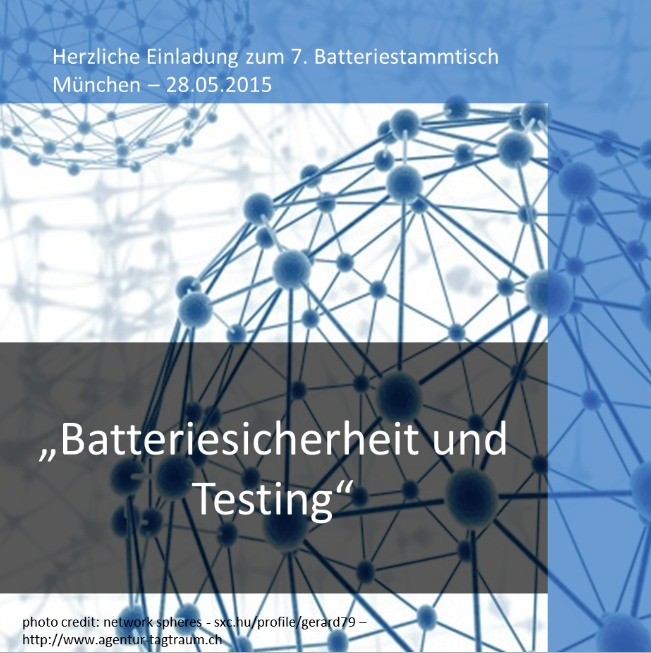 „Fokus Batteriesicherheit - Tests, Versicherungspraxis und Laborführung"
„Fokus Batteriesicherheit - Tests, Versicherungspraxis und Laborführung"
Der Stammtisch mit dem Fokus auf Batteriesicherheit und Testing hat am 28. Mai 2015 stattgefunden. Diesmal hat uns die TÜV SÜD Battery Testing GmbH das Casino für unser Netzwerktreffen zur Verfügung gestellt.
An diesem Stammtisch standen wieder wirtschaftliche und Industriefragestellungen von Batterien im Vordergrund. Ein besonderes Schmankerl war die Führung durch die Labore der TÜV SÜD Battery Testing GmbH.
Die Themen und Sprecher waren:
Thema: „Anforderungen an Traktionsbatterien aus Sicht einer Versicherung“
Vortragender: Herr Carsten Reinkemeyer, AZT Automotive GmbH Allianz Zentrum für Technik
Thema: "Erprobungs- und Zertifizierungsmöglichkeiten zur Absicherung der Risiken von Li-Ionen Batterien“
Vortragender: Herr Dipl. Wirt. Ing. Johannes Brey
Die Präsentation kann bei dem Geschäftsführer der TÜV SÜD Battery Testing GmbH Herr Brey (Diese E-Mail-Adresse ist vor Spambots geschützt! Zur Anzeige muss JavaScript eingeschaltet sein!) direkt angefragt werden.
Als weiterer Höhepunkt des Abends stand die geführte Besichtigung der Testlabore der TÜV SÜD Battery Testing GmbH an. Dies war ein besonderes Highlight und an dieser Stelle vielen Dank.
Danach stand wieder viel Zeit für persönliche Gespräche und Netzwerken zur Vefügung.

Wir möchten Sie auf den Fragebogen "global chemical energy industry snapshot 2015" aufmerksam machen. Bitte nehmen Sie sich 10 Minuten Zeit zum beantworten. Es handelt sich um ein Projekt von Iceventure und Shmuel De Leon Energy Ltd..
Prof. Gasteiger, TU München
1. Welchen Fokus/Schwerpunkt haben Sie im Bereich chemische Energiespeicher?
Unsere Arbeitsgruppe befasst sich mit der Untersuchung von Elektrolytadditiven, deren anodische und kathodische Zersetzung mittels on-line Massenspektrometrie, ex-situ infrared Spektroskopie (ATR-FTIR) und Lade-/Entladezyklen Tests (kleinformatige Dreielektrodenzellen, Knopfzellen, Pouchzellen) bestimmt werden. Ein weiterer Themenschwerpunkt sind die Herstellung und Charakterisierung von Slurries, die für die Beschichtung von Elektroden verwendet werden. Die Metallauflösung von Hochvolt-Kathoden wird mittels operando Röntgenabsorptionsspektroskopie (XAS) in Zusammenarbeit mit Prof. Moniek Tromp’s Gruppe an der Universität Amsterdam untersucht. Zu diesen Arbeiten im Bereich von Lithiumionen Batterien, untersuchen wir Elektrodenprozess in Lithium-Luft und Lithium-Schwefel Batterien. Für weitere Details s. www.tec.ch.tum.de
2. Welche Lösung(en) bietet Ihre Organisation in diesem Bereich an bzw. welche sucht sie?
Wir kooperieren mit zahlreichen anderen Gruppen und Industriepartnern im Rahmen zahlreicher öffentlich und bilateral geförderter Forschungsprojekte.
3. Wo sehen Sie die größten Herausforderungen für chemische Energiespeicher in den nächsten 5 Jahren?
Vor allem für automobile Anwendungen ist eine Erhöhung der gravimetrischen und auch volumetrischen Energiedichte essentiell, wobei allerdings auch Kosten eine grosse Rolle spielen.
4. Was macht Deutschland im Bereich chemische Energiespeicher richtig?
IProduktionsgerätehersteller und Materialhersteller leisten in Deutschland einen signifikanten Beitrag zur Weiterentwicklung der Lithiumionenbatterie Technologie. Auch die Entwicklung von Batteriemodulen/-systemen ist in Deutschland international sehr wettbewerbsfähig.
5. Was könnte man besser machen?
Man hat in den vergangenen fünf Jahren sehr viel Expertise und industrielles know-how aufgebaut. Für den zukünftigen Erfolg darf aber nicht vergessen, dass nur ein langfristig angelegtes F&E Programm dahin führen kann.
6. Der Batteriestammtisch ....
„…ist ein ausgezeichnetes Forum, um Forscherkollegen aus der näheren Umgebung in angenehmer Atmosphäre kennenzulernen und Erfahrungen auszutauschen.“
Prof. Gasteiger
Februar 2015
PD Dr. Andrea Balducci, HI Ulm
1. Welchen Fokus/Schwerpunkt haben Sie im Bereich chemische Energiespeicher?
Ich arbeite an der Entwicklung und Charakterisierung von neuen Elektrolyten und Aktiv-Inaktiv-Materialien für Lithium-Ionen-Batterien und Superkondensatoren.
2. Welche Lösung(en) bietet Ihre Organisation in diesem Bereich an bzw. welche sucht sie?
Das Helmholtz-Institut Ulm hat das Ziel, Batterien und Superkondensatoren im Bezug auf Sicherheit, Kosten, Zyklen-Stabilität, Energiedichte und Leistungsdichte zu verbessern.
3. Wo sehen Sie die größten Herausforderungen für chemische Energiespeicher in den nächsten 5 Jahren?
Die größten Herausforderungen werden auf der einen Seite die Entwicklung von Energiespeichern mit verbesserter Leistungsfähigkeit sein und auf der anderen Seite eine massive Einführung von Batterien und Superkondensatoren in stationäre und automobile Anwendungen.
4. Was macht Deutschland im Bereich chemische Energiespeicher richtig?
Ich glaube dass viel Aufwand betrieben wurde in den letzten Jahren in Deutschland. Dieser Aufwand führte zu einer Festigung von industriellem und wissenschaftlichem Fachwissen im Bezug auf elektrochemische Energiespeicher. Ich glaube dass ohne die Schaffung dieses Fachwissens Deutschland nicht konkurrenzfähig wäre gegenüber anderen Akteuren in diesem Bereich
5. Was könnte man besser machen?
Die Stärkung der Zusammenarbeit zwischen verschiedenen Akteuren, der Wissenschaft und der Industrie in diesem Bereich wäre wünschenswert.
6. Der Batteriestammtisch ....
Der Batteriestammtisch bietet eine gute Möglichkeit um in einer freundlichen Atmosphäre mit Leuten aus Industrie und Wissenschaft in Kontakt zu treten, welche an elektrochemischen Energiespeichern arbeiten.
PD Dr. Andrea Balducci
Februar 2015
Simon C. Müller, TU München
1. Welchen Fokus/Schwerpunkt haben Sie im Bereich chemische Energiespeicher?
Wir untersuchen v.a. Innovation und Geschäftsmodelle im Bereich von chemischen Energiespeichern. Um im Bereich Innovation über die Weiterentwicklung der Batterietechnologien Aussagen treffen zu können, analysieren wir unter anderem weltweit Patentdaten. Im Bereich Geschäftsmodelle untersuchen und entwickeln wir Szenarien, in denen stationäre Energiespeicher wirtschaftlich sinnvoll in Stromnetze integriert werden können und damit für Investoren attraktiv sein können.
2. Welche Lösung(en) bietet Ihre Organisation in diesem Bereich an bzw. welche sucht sie?
In beiden oben genannten Bereichen besitzen wir umfassende Kompetenzen. Daneben besteht die Möglichkeit, geeignete wissenschaftliche Fragestellungen auch im Rahmen studentischer Arbeiten zu erforschen.
3. Wo sehen Sie die größten Herausforderungen für chemische Energiespeicher in den nächsten 5 Jahren?
Größte Herausforderung und gleichzeitig am wichtigsten sind sicherlich Kostensenkungen. Der aktuell niedrige Ölpreis verschärft diese Notwendigkeit nochmal. Daneben ist die Sicherheit ein Bereich, der vielleicht nicht mehr ganz so stark debattiert wird, in dem aber dennoch keine Rückschläge passieren sollten, um die Verbreitung chemischer Energiespeicher nicht zu gefährden. Zu guter Letzt wird natürlich die Erhöhung der Energiedichte für die Automobilindustrie wichtig sein.
4. Was macht Deutschland im Bereich chemische Energiespeicher richtig?
Positiv zu bewerten ist sicherlich, dass die Bedeutung von Energiespeichern mittlerweile in Deutschland vielen Akteuren klar ist.
5. Was könnte man besser machen?
Aus deutscher Sicht wäre natürlich eine starke Industrie, inklusive einer großskaligen Zellproduktion vor Ort vorteilhaft, damit die Wertschöpfung in Deutschland nicht nur auf Modul- sondern auch auf Zellebene stattfinden würde.
6. Der Batteriestammtisch ....
ist eine spannende und zahlreich besuchte Plattform, um mit Personen, die an gleichen Themen arbeiten, in den Austausch treten zu können.
Simon C. Müller
Februar 2015
Energiespeicher, SaaS & Innovation – Seminare in 2015 von Iceseminars
Iceseminars, das Beratungs- und Wissenstool des Beratungsunternehmens Iceventure, präsentiert das Programm für 2015. Es besteht aus verschiedenen Seminaren im Bereich Batterien, Software as a Service, Strategie für Unternehmen in Zeiten der Eurokrise, digitalem Wandel und Energiewende und Innovationsgenerierung. Workshops und verschiedene innovative Veranstaltungen runden das Angebot ab.
das Seminarjahresprogramm für 2015 - SaaS, chemische Energiespeicherung Innovationsgenerierung und Strategie
Wirtschaft 2030 - Strategien für Unternehmen in Zeiten der Eurokrise, Digitalisierung und Energiewende
 Sind Sie, Ihr Unternehmen oder Ihre Organisation bereits für die Wirtschaft 2030 aufgestellt?
Sind Sie, Ihr Unternehmen oder Ihre Organisation bereits für die Wirtschaft 2030 aufgestellt?
Das aktuelle und andauernde Großereignis Eurokrise, der digitale Wandel und die Energiewende erfordert eine neue Form der Analyse und neue Strategien im Bereich der Unternehmensführung.
Neben diesen Fakten und ihrer Quantifizierung kommt als zweiter Faktor "der Zeitpunkt" und sein Kontext hinzu. An der Schwelle eines säkulare Umbruchs, wie er für das Seminar als These genommen wird, ist Querdenken eine Tugend.
In dem Seminar werden die Analysen aktueller makroökonomische Ereignisse komprimiert besprochen und die Auswirkungen auf Technologienutzung und Anwendung skizziert. Darauf folgt eine quantitativ abgesicherte qualitative Szenarienentwicklung, um Führungspersonal neue und entscheidenden Ansätzen für die Strategieentwicklung und Produktinnovation zu geben.
6. Runde - Fokus Batterieforschung: Batteriepatente, HV Batteriesystem-Robustheit und innovative Elektrolyte
Die Fraunhofer-Projektgruppe Elektrochemische Speicher München-Garching, der Lehrstuhl für Elektrische Energiespeichertechnik der TU München und Iceventure sagen Danke an alle Teilnehmer des 6 Batteriestammtisch München.
Die Nachberichterstattung und die Präsentationen werden in Kürze bereit gestellt. Das Thema war:
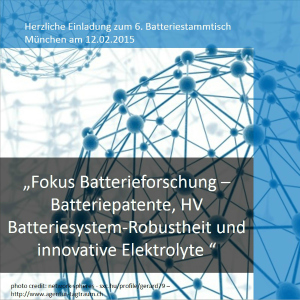
„Fokus Batterieforschung – Batteriepatente, HV Batteriesystem-Robustheit und innovative Elektrolyte"
An diesem Stammtisch stand wieder die Batterieforschung im Vordergrund.
Entwicklung einer Methode zum Nachweis der Robustheit von HV Batteriesystemen für HEV und EV
Vortragender:
Prof. Hans-Georg Schweiger, TH Ingolstadt
Der zweite Beitrag hatte den Titel "Internationale Patentierungstrends im Bereich elektrochemischer Energiespeicher"
Vortragender:
Simon C. Müller, TU München
Vortrag zum Download - Kennwort bitte anfordern bei Diese E-Mail-Adresse ist vor Spambots geschützt! Zur Anzeige muss JavaScript eingeschaltet sein!
Ein weiterer Beitrag lautete: "Protic ionic liquids: innovative electrolytes and material precursors for lithium-ion batteries"
Vortragender:
PD Dr. Andrea Balducci, HI Ulm
Danach war wieder viel Zeit für persönliche Gespräche und Netzwerken.

Wir möchten Sie auf den Fragebogen "global chemical energy industry snapshot 2015" aufmerksam machen. Bitte nehmen Sie sich 10 Minuten Zeit zum beantworten. Es handelt sich um ein Projekt von Iceventure und Shmuel De Leon Energy Ltd..
Bernhard Rill, Gustav Klein GmbH
1. Welchen Fokus/Schwerpunkt haben Sie im Bereich chemische Energiespeicher?
Chemische Energiespeicher spielen für uns als Hersteller von intelligenter Hochleistungselektronik für Netzstützung, sowie der Batteriesimulations- und Testsysteme eine immer größer Rollen daraus hat inzwischen ein wesentliches Standbein für uns entwickelt.
2. Welche Lösung(en) bietet Ihre Organisation in diesem Bereich an bzw. welche sucht sie?
- intelligente Hochleistungselektronik zur Netzstützung und Netzbildung
- Batterie Test- und Simulationssysteme
- Ab Mitte 2015 DC/DC Wandler zur Zwischenkreisspeisung mit MPP-Tracking
3. Wo sehen Sie die größten Herausforderungen für chemische Energiespeicher in den nächsten 5 Jahren?
Reduktion der Herstellungskosten bei gleichzeitiger Erhöhung der Qualität und Betriebssicherheit der Einzelzellen und Systeme
4. Was macht Deutschland im Bereich chemische Energiespeicher richtig?
Förderung der Erprobung von Systeme
5. Was könnte man besser machen?
Förderung der industriellen hochqualitativen Fertigung von Li-Ionen in Deutschland.
6. Der Batteriestammtisch ....
Gute Möglichkeit sich mit Spezialisten aus der Branche zu unterhalten und sich über neue Entwicklungen zu Informieren.
Bernhard Rill
November 2014

